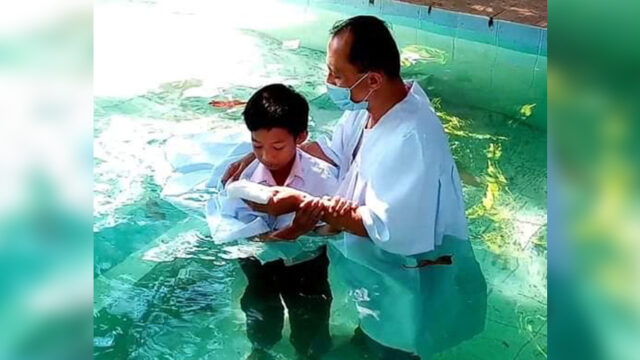We are reminded that atonement requires the shedding of blood.

Some stories in Scripture are just plain difficult to understand. Yet if we pay careful attention, we may discover unexpected blessings and helpful lessons for our own lives.
Rizpah’s story falls into this category. Most of us may have never heard her name. She appears only twice in Scripture. The first time she emerges she seems to be a pawn caught between two powerful men. Ish-bosheth, one of King Saul’s surviving sons, has been made king of Israel by Abner, Saul’s mighty general. At the same time, Judah had anointed David king. There was strife and civil war in Israel.
Second Samuel 3 describes the strife within Ish-bosheth’s camp. The insecure, slightly paranoid king of Israel suspects treason all around him. In 2 Samuel 3:7, 8 he insults his general, Abner, by accusing him of having slept with Rizpah, Saul’s concubine. At a distance of three millennia, we may not grasp the enormity of this accusation. Concubines were wives of lower status whose children were considered part of the husband’s household and his rightful heirs.
Ish-bosheth’s accusation was serious—it suggested an act of open rebellion (cf. Absalom in 2 Sam. 16:21, 22). But for Ish-bosheth, Rizpah was just a nameless piece of royal real estate; in fact, in 2 Samuel 3:7, 8 he calls her “my father’s concubine.” It seems as if Rizpah isn’t a person with a name, feelings, and a history. Instead, she is a pawn in a royal gamble. Like so many others through history, she was thought of as powerless, voiceless—an object to be manipulated.
Abner’s reaction (“this woman” in verse 8) similarly reflects Ish-bosheth’s indifference toward Rizpah. Abner’s pride, however had been severely hurt by the accusation, and he decides to join David’s camp, marking the beginning of the end for Ish-bosheth. Soon David is crowned king over all the 12 tribes of Israel (2 Sam. 5:1-3).
Justice
Rizpah’s second appearance in the biblical text can be found in 2 Samuel 21:1-14. It’s a difficult story that happened in difficult times.
We are told two crucial pieces of information. First, “there was a famine” lasting three years. The second piece of information involves King David himself. Faced with the unexplainable drought, he “inquired of the Lord.” David, the anointed of the Lord, continues to run to God when he feels inadequate or helpless. Here is the good news of 2 Samuel 21:1: God is still talking to His people. God isn’t far removed, uninterested, or too busy. The message, however, is ominous: “There is bloodguilt on Saul and on his house, because he put the Gibeonites to death” (verse 1, ESV).1 Bloodguilt, especially when designated by God Himself, cannot be resolved by cash or gifts. Bloodguilt requires the shedding of blood (cf. Gen. 9:6; 37:22; Num. 35:33; Deut. 21:7).
We aren’t told the exact nature of Saul’s bloodguilt involving the Gibeonites. No gruesome details or shocking revelations—just a simple verdict. We are told that the Gibeonites (who were part of the Amorites or Canaanites living in Canaan during the time of the conquest; (cf. Joshua 9) suffered from Saul’s genocidal zeal.
David’s address to the Gibeonites is straightforward and very personal. “What shall I do for you? And how shall I make atonement, that you may bless the heritage of the Lord?” (2 Sam. 21:3, ESV). David takes this very personally.
The rest of the dialogue is quickly summarized. The Gibeonites understand that bloodguilt requires the shedding of blood—but not just any blood. They ask for the lives of seven descendants of Saul—and David agrees to the terms.
We cringe at this turn of events. This doesn’t sound like the God of the New Testament who offers willingly (albeit with tears in His eyes) His Son as a sacrifice to take away the sin of the world—or does it? Can the story of David and the Gibeonites help us understand the good news of salvation in more powerful ways? In both stories, we are reminded that atonement requires the shedding of blood.
The next part of the story reintroduces Rizpah into the biblical narrative. Two of the seven descendants of Saul who were executed “on the mountain before the Lord” are her sons. According to the biblical text, all this happened “at the beginning of the barley harvest” (verse 9, ESV), sometime at the end of March or the early days of April.
A Quiet Guard Becomes a Nation Builder
This is Rizpah’s moment, and she appears on the scene without a royal announcement or the blast of a trumpet. Rizpah doesn’t talk; she acts. She stays when the shame is made public. She protects the corpses of the executed members of her family against desecration and destruction. If the reference to the beginning of the rainy season refers to the autumn rainy season, then Rizpah guarded the bodies for six months! Imagine the hardship of fending off predators and suffering the accusing looks of the people who walked past—day in and day out. In biblical times the ultimate retribution against an enemy was the desecration of his corpse by savage animals (cf. 2 Kings 9:36). Rizpah doesn’t allow that to happen.
We never hear from Rizpah during her vigil. We never hear her voice while two powerful men argue over her. We never see her claim a stake in the struggle for power and influence. Rizpah simply acts. Her powerful quiet witness speaks volumes and even reaches David’s court—and heart.
In fact, it is Rizpah’s unselfish service that ultimately paves the way for David, the nation-builder. When the king is told that Rizpah has faithfully guarded the dead bodies of the men of Saul’s household, something in his heart seems to “click.” Finally, David acts, and he orders the remains of Saul, of Jonathan, and all the other deceased members of Saul’s family be taken to their ancestral resting place in the territory of Benjamin. It’s the beginning of national reconciliation. It’s only after the burial of the deceased of Saul’s family that “God heeded supplications for the land” (verse 14, NRSV).2 The famine was broken.
What Can We Learn?
Here are three lessons we can learn from one of Scripture’s shadow figures.
God can use anybody to change the course of history. Imagine David’s story without Rizpah. There most likely wouldn’t have been a united monarchy; civil war may have prevailed. Even more significant: there wouldn’t have been national reconciliation. The Benjamites would have felt marginalized, which, most likely, would have led to unrest—and more civil war. I know God’s possibilities are endless, but Rizpah was available and willing to step into the breach.
God doesn’t want us to play power games. Rizpah didn’t instigate a coup d’état at Ish-bosheth’s compound on the other side of the Jordan. Her silent appearance is a good reminder that there are moments when we need to “be still” and watch for God’s hand working in our lives. Other moments require boldness, vigor, and action. Understanding God’s goal for us in a given situation isn’t always easy. Our natural bent—male and female—is toward control and dominance, instead of humble service and godly action.
Rizpah knows what she needs to do. She knows that she is safe only under God’s protective shield. How did she know that? Who told her? What made her stay and bear the shame? Somehow she must have recognized that her worth was anchored in the One who controlled even powerful King David—Yahweh, the Lord of Israel.
1 Scripture quotations marked ESV are from The Holy Bible, English Standard Version, copyright © 2001 by Crossway Bibles, a division of Good News Publishers. Used by permission. All rights reserved.
2 Bible texts credited to NRSV are from the New Revised Standard Version of the Bible, copyright © 1989 by the Division of Christian Education of the National Council of the Churches of Christ in the U.S.A. Used by permission..








